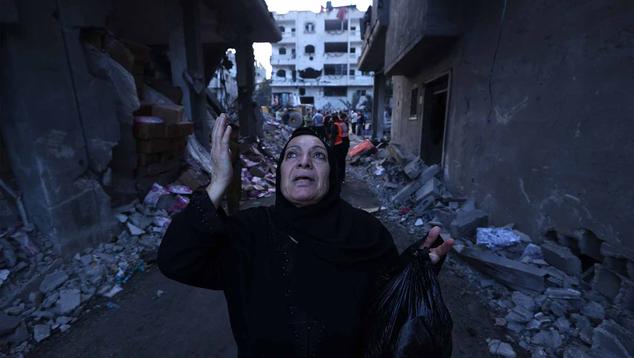Story Highlights
- 84% of Palestinians have little to no trust in President Joe Biden to help negotiate peace
- 24% of Palestinians support a two-state solution, down from 59% in 2012
- Young Palestinians significantly less likely to believe in two states living side by side
Editors’ Note: This article represents the views of Palestinians based on World Poll interviews conducted between July and September that concluded the week before Hamas launched an attack on Israel. Gallup’s World Poll fieldwork in Israel was scheduled to begin Oct. 9, but the war has delayed polling.
WASHINGTON, D.C. -- Palestinians likely had low expectations for President Joe Biden’s visit on Wednesday to the Middle East. After a stop in Israel, Biden was scheduled to meet with Arab leaders, including Palestinian Authority President Mahmoud Abbas, to discuss humanitarian aid. That leg of the trip was canceled abruptly Tuesday after the deadly bombing of a Gaza hospital.
Like his predecessors, most Palestinians do not trust Biden to help mediate a fair peace treaty between Israel and the Palestinian Territories. Eighty-four percent of Palestinians polled in the months and weeks leading up to Hamas’ Oct. 7 attack on Israel said they have little to no trust in Biden, including 70% who said they have “none at all.”
While a peace treaty may not be on the horizon in the near future, the historical general distrust of America’s ability to be a fair arbiter between the two parties may also limit Biden’s ability to influence Palestinian leadership to take more immediate actions conducive to peace.
Hamas’ unprecedented attack against Israel and the outbreak of war has refocused international attention on the long-running Arab-Israeli conflict. In the months and weeks leading up to the Oct. 7 attack, about one in four Palestinians (24%) living in the West Bank, Gaza and East Jerusalem said they supported a two-state solution to the conflict, with an independent Palestinian state existing alongside Israel.
Support for a two-state solution among Palestinians has more than halved since 2012, when nearly six in 10 (59%) endorsed the idea.
A two-state solution, first proposed by the British government’s Peel Commission in 1937 and repurposed in various forms ever since, has long been the baseline for peace mediation between both sides. In more recent years, the 1993 Oslo Accords aimed to set the conditions for Palestinian self-determination, while both U.S.-led mediation and the 2002 Saudi-backed Arab Peace Initiative set out goals for two states.
Nonetheless, the continued viability of a future independent Palestinian state has increasingly been put into doubt by both regional experts and foreign diplomats as Israeli settlements have expanded into the West Bank on land Palestinians want for a future state.
Generational Divide on the Two-State Solution
Younger Palestinians no longer support a solution that would see two countries existing side by side. One in six Palestinians between the ages of 15 and 25 said they support a two-state solution, compared with 34% of Palestinians aged 46 and older. Given the youthful demographic of the Palestinian Territories, where 69% of the population is under the age of 29, skepticism among young people signals a concerning turn for the future should a diplomatic solution seem out of reach.
No Hope for Permanent Peace in Gaza
Before war broke out, four in five Palestinians (81%) said they no longer believe that a permanent peace of any kind will ever prevail, including 84% living in the Gaza Strip. Seventy-five years after the establishment of the Israeli state, just 13% of Palestinians retain any hope that peace may one day be achievable.
Palestinians are not alone in their pessimism, however. When Gallup last asked Israelis the same question in 2017, 30% believed it would be possible, while the majority (57%) said it would not.
Bottom Line
Hamas’ killing of an estimated 1,400 Israelis -- the vast majority being civilians killed in their homes -- has been followed by another humanitarian crisis in Gaza. Already, as many as 3,000 Palestinians have been killed in Israeli retaliatory bombing, as a potential Israeli ground invasion appears imminent.
Even before the latest chapter in the conflict, Palestinians’ belief in the potential for diplomatic solutions had reached a historical low. The latest spate of killing in Israel and Gaza only threatens to put a solution further out of sight than it has been in generations, with promises of more violence in the future.
To stay up to date with the latest Gallup News insights and updates, follow us on X.
For complete methodology and specific survey dates, please review Gallup's Country Data Set details.
Learn more about how the Gallup World Poll works.




